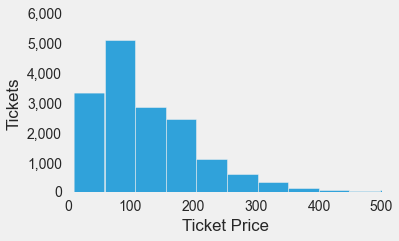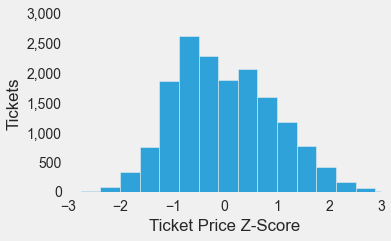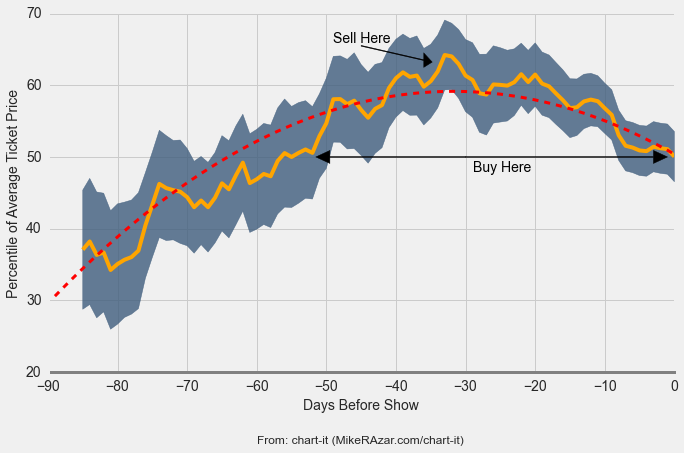A couple of weeks ago, Stromae performed at a sold out show in Washington, DC. Several friends were scouring StubHub and Craigslist for tickets, but ticket prices seemed to be all over the place. That got us wondering whether the market price for concert tickets exhibits any patterns that can be used to improve your chances of getting the best price (highest, if you’re the seller; lowest, if you’re the buyer).
First, we needed a dataset of market transactions for concert tickets. As it turns out, StubHub provides this data to help sellers determine a listing price. Unfortunately, StubHub would not provide us with a dataset of sold ticket prices so we had to manually scrape their website over the course of a couple of weeks. Our dataset includes 16,562 ticket sales from 32 concerts in 17 cities and from 20 different artists. We started out with more than 20,000 ticket sales but remove transactions that occurred earlier than 90 days before the show, as well as the top and bottom 5th percentiles to remove outliers in the data.
The source code for the analysis can be found here. We usually provide the dataset but, in this case, we’ll need StubHub’s approval to share the data that we scraped from their website.
Grouping and Standardizing Ticket Prices
Since ticket prices vary by city, show, seating section, date, etc., the first challenge was to group the raw data into categories in order to compare the 16,562 data points that we have in a meaningful way. We’re interested in the change in ticket prices for each seating section as the date of the show approaches, so we grouped the data by section (e.g., ‘Ed Sheeran / New York / Orchestra 201’ would be one section) with the timeline being the number of days before the show.
A second challenge was to scale or standardize ticket prices whose absolute dollar value varies significantly from section to section. After all, we are interested in the movement of prices over time and not their absolute dollar value. To standardize the prices, we used z-score scaling, which transforms each ticket price into a value that represents its position (percentile rank) within its section assuming a normal distribution of prices. In other words, the average/mean ticket price in each section will have a value of zero and the standard deviation of prices in each section will be one (meaning that 95% of ticket prices in each section will have a z-score between -1.96 and 1.96). This makes it easier to compare the relative movement of ticket prices across sections because now prices in each section have the same scale (roughly -2.0 to 2.0, with an average of zero), instead of an absolute dollar value (which, in our case, ranges from a few dollars to more than $500, with different averages for each section).
Figure 1 shows the impact of z-score scaling on the distribution of the ticket prices in our dataset. As you can see, z-score scaling standardizes the ticket prices by converting them into a normal distribution with mean zero and standard deviation of one. This allows us to compare ticket prices across sections as the average ticket price in each section will be zero and the distribution of ticket prices will be the same.
Figure 1. Ticket Price Frequency Distribution
Ticket Price Pattern
Figure 2. Ticket Price Pattern
From the period between 90 and 30-35 days before a show, ticket prices tend to gradually increase, peaking about 30-35 days before a show. After that, prices start to fall until the day of the show. We suspect that this pattern is the result of people’s scheduling habits. Between 90 and 30 days before a show, demand grows as people start planning to attend a show and go purchase tickets from the market. Supply, on the other hand, is limited, as most ticketholders also plan to attend the show. In the last 30 days, the price is driven down by an increase in the supply of tickets as unexpected schedule conflicts force people who had previously planned to attend a show to sell their tickets.
Based on the pattern above, the best time to buy a concert ticket is about 55 days before a show (the earlier the better). If that time has passed, then you’re better off waiting until the day of the show to buy your ticket as prices are likely to gradually fall over the last 30-35 days. On the day of the show, ticket prices are on average as low as they were about 55 days before the show.
If you’re a seller, you’re most likely to get the highest price for your ticket 30-35 days before the show. If you’re looking to sell in the last 30 days (because of an unexpected schedule conflict?), you should do so right away. The price is likely to continue falling until show time.



I like the valuable information you provide in your articles.
I’ll bookmark your blog and check again here regularly.
I am quite sure I will learn a lot of new stuff
right here! Best of luck for the next!
Great post! We will be linking to this particularly great article on our website. Keep up the good writing.
Hey! I’m at work browsing your blog from my new apple
iphone! Just wanted to say I love reading your blog and look forward to all your posts!
Keep up the fantastic work!
I am so grateful for your article post.Really thank you! Really Cool.
Hi great data, I just wonder if this applies also to NFL ticket model.
I wish I had the data to do that analysis.
Wow! Great Article! This was very helpful!
How did you manually scrape their website to get your sold ticket transaction data?
StubHub shows historical ticket sales prices for every concert up until the point when the concert begins. So I would stalk the StubHub website and manually copy paste the historical sales data for each concert!
Do you have any plan to do a chart like this for sporting events as opposed to concerts to see if they follow the same curve? I would be very interested personally.
If I had a database of ticket sales data, I would. It took me so long to scrape the data for the concert tickets! StubHub wouldn’t send me their data, I had to scrape it manually.
I’m a student trying to better understand this data. Is the 50th percentile the best time to buy because you pay the least for the best seat or is it because ticket prices are average?
The data shows that you’d be better off buying a second-hand ticket either earlier than 50 days before the concert or the day of the concert (if the 50 day mark has already passed). The fact that this is the 50th percentile is incidental (because there is a flurry of sales the day of the show, that price is most likely to be the 50th percentile price because there are so many more data points).
What about Hamilton TOUR tix?
Good question! Wish I had a dataset of Hamilton ticket transactions.
Why is the best time to buy not opposite of what is marked on the chart?
Wow, next time you would like to buy a ticket, give me a call.
Absolute legend. I’ll put this to the test, and let you know how i get on.
I plan on doing this for NFL tickets this upcoming summer into the season. I think it will be interesting since those events tend to be sold out and the supply/demand effects may be different than in this exercise. I think one interesting thing worth exploring is an analysis of events that are in very high demand versus those that are more lukewarm. I have a feeling that Figure 2 (the ticket price pattern) reflects both types of concerts and is a good overall picture of Stubhub activity. However, I think if you looked at popular vs. less popular events, the patterns could be somewhat different.
Did you end up doing your research. I’m curious to see how trends are different.
Very good data and concur, that 30-35 days before the show is the best time to sell and best time to buy is 55 days before or day of show. As the owner and founder of a successful secondary ticket marketplace, Top Event Promoter (http://www.topeventpromoter.com) I have seen these same trends on my website. I’d be interested to see sold out events charted trends. Good work!
Thanks for the feedback. I’m happy to analyze the data if you can provide a dataset of ticket sales data for sold out events.
@mike @anthony I’m curious if you ever conducted this analysis? Are there different best sell date timeframes for different sports and events or is 30-35 days commonplace?
“This is one awesome blog article.Much thanks again. Much obliged.”
Thanks for sharing great information with us. I love watching a live concert.
Hi, two years later, but do you have data per day of the week?
I.e. for a Monday or Tuesday show, we’re there statistically significant differences than a weekend show?
The best time is anytime to buy a concert ticket. The price is never static so never wait for the price to fall down. There are some chances to get cheap tickets in the last week of the concert and the reason is simple the manager wants to sell the extra tickets which are left. To buy the cheapest for any concert try eTickets.ca and ticketsbuzz.com these websites provides the best tickets.
Thanks for sharing with us. it’s a great article and must need for me. I have missed many times to buy concert tickets.
Does this logic apply to special events like New Years? I would think that there are a lot of last minute buyers in this situation, and a great opportunity to make money. I’m new to the business and would love to know your thoughts. Thanks!
For big shows (ACC etc) if there are any tickets left ~48 hours before it starts they will begin dumping them for cheap. You won’t get good seats but you can see a big ticket act for like $30 if that’s all you care about. Been using http://www.etickets.ca from ages, Cheap Concert tickets canada & USA. Even the Last minute tickets are cheaper then other ticketing websites.
For big shows (ACC etc) if there are any tickets left ~48 hours before it starts they will begin dumping them for cheap. You won’t get good seats but you can see a big ticket act for like $30 if that’s all you care about. Been using (http://www.etickets.ca) from ages, Cheap Concert tickets Canada & USA. Even the Last minute tickets are cheaper than other ticketing websites.
When tickets first go on sale they’ll be expensive through ticket brokers, but as the event gets closer they’ll drop in price provided the demand isn’t too high. … If you can hold out until the day before or day of an event you’ll likely save money on tickets. Top Event Promoter (https://www.etickets.ca) I did have seen the same trends on this website too.
Good work!